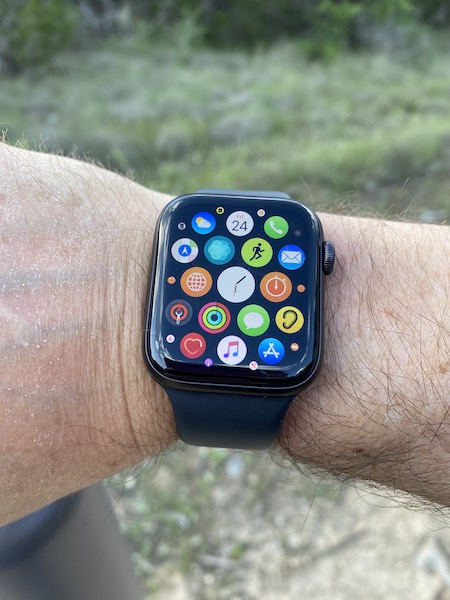
It’s ironic, I suppose, that most of the major watchmakers chose this day – the Apple Watch’s fifth birthday – to release a tsunami of new timepieces. The Apple Watch is, after all, putting the final nail in the coffin of the traditional watch. Well, the traditional watch as we know it. Is that a good thing or a bad thing? . . .
Lovers of the traditional watch aren’t even asking the question. They’re stuck in denial, the first stage of the DABDA grieving process. The argument buoying their false hope: the Apple Watch is a gateway drug to traditional watch-wearing for a generation that grew up with a smartphone and no wristwear whatsoever.
It’s a specious argument.
For 33 million Apple Watch buyers this year, for a total and growing population of some 100 million users, the Apple Watch isn’t everything. It’s the only thing. It’s a daylong and soon sleep-tracking nighttime companion. An irreplaceable device that monitors and influences their health, wealth and yes, happiness.

As they live through the Apple Watch’s fifth birthday, many traditional watch enthusiasts have moved on to stage two of the grieving process: anger.
I will never wear one of those soulless electronic nannies! They’re plastic junk! The Apple Watch is the enemy, an interloper into the rhythm of life. It threatens privacy. Individuality. Freedom.
The haters aren’t entirely wrong. But they are pissing in the wind – as many traditional watch enthusiasts move on to bargaining.
People will wear an Apple Watch some of the time (e.g., exercising), a traditional watch the rest of the time. It’s not either or. It’s both! There’s room for both! Kumbaya.
Yes, well, the Apple Watch is insidious. Its apps have a way of becoming indispensable. Those who can switch back and forth between watch genres are outnumbered by those who wear an Apple Watch and . . . that’s it. A trend that shows no signs of diminishing and every sign of accelerating, as a generation grows up without every having worn anything else.

The next stage is depression. That will come as traditional watches become marginalized, as their market share continues to shrink.
Today, on the day when wonderful new models of traditional watches are dropping by the dozens, that eventuality seems distant, almost laughable. But the pocket watch industry was equally dismissive at the end of World War I, when returning soldiers de-feminized the “wristlet,” ushering-in the pocket watch’s complete replacement.
The Apple Watch signals an even more profound change than that. Its impact is more akin to the effect of television on radio. Radio didn’t disappear, but television’s soaring popularity robbed radio of its commercial and cultural dominance. The all-singing, all-dancing smartwatch is doing the same thing to the traditional watch.

And so to acceptance. ‘Cause it’s not so bad, really . . .
Whenever a new medium replaces an old one, it frees the old medium to reinvent itself. Radio still exists, but it’s nothing like radio of the forties. No more “as it happens” news. No more gathering around the radio to thrill to drama. Enter Howard Stern and Spotify. Today’s radio serves a different purpose in different ways.
In the same sense, traditional watches will continue to exist post-smartwatch, but they will be nothing like what they are today. They’ll evolve with new materials, designs and maybe even functions. It’s already happening.

Notice that expensive wristwatches are becoming more expensive. More exclusive. More precious. High end watchmakers are experimenting with 3D printing and odd shapes and sizes. There are watches without hands. Watches that recreate designs of the past with modern technology. Experimentation is everywhere.
Is there room at the top for so many traditional brands and dozens of innovators in The Age of the Apple Watch? I don’t think so. Future generations of luxury watch buyers will be wearing them less. Which means they’ll be buying less of them. Which means there’ll be less money to sustain so many brands.
Is this the traditional watch’s hurrah? Not exactly.

The Apple Watch is freeing the traditional watch from the tyranny of utility. It’s returning traditional watchmaking to its earliest days, when wealthy buyers subsidized the sublime. The traditional watch will have the Apple Watch to thank for this transformation. Now excuse me, I’ve got a few pocket watches that need winding.